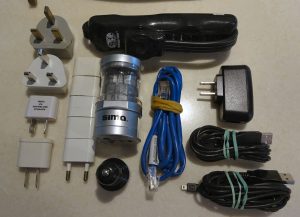I’ve spent the biggest part of my life in “bad places”, either as part of my job or while in the military. I grew up in New Delhi, Athens, Frankfurt, and Bangkok.
Life in bad places is hard. Life in Africa can be damn near impossible, especially if you screw yourself by forgetting something important.
When I turned 18 I came back to the U.S. to attend college, then joined the military, which sent me back overseas to Germany, Italy, Johnston Atoll, Turkey, Greece, Iraq, Afghanistan, Saudi Arabia, and a lot of other worse places. When I retired from the Army I took a job with the government that required almost constant worldwide travel to “bad places”. That’ll be our generic term from this point forward. Yeah, they’re exciting and fun places to go, but a bit off the beaten path. Still, some of the most exciting things on Earth can be found in “bad places”, and many people go on “adventure vacations” to them so I thought you might benefit from my lesson learned. Everyone’s been to Aruba, but how many of us can say we’ve survived Bujumbura during a coup, been shot in Sudan, bit by a snake in Botswana, or in a helicopter crash in Mozambique? THOSE are truly bad places. But they were fun and my memories are vivid.
Hotels – Your REAL home
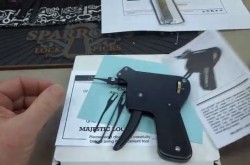
Life in bad places is hard. Life in Africa can be damn near impossible, especially if you screw yourself by forgetting something important. And I’ve done it too many times. I’ve forgotten shoes, uniform parts, ties, belts, underwear and socks. I even forgot my shaving kit one time on a 30-day trip. That was fun.
Everyone should have their own packing list. I made up my own, laminated it and leave it in my suitcase all the time. Since everyone has different needs I’m going to let you make up your own list of personal clothing. I’ll discuss some of the unique items and my logic for carrying them.
The easiest way to not forget anything is to pack the same way every time. Pack your shoes in exactly the same place every time. Fit your suitcase together like a jigsaw puzzle, with everything stacked in the same order on every single trip. Like the puzzle, you’ll quickly notice if one of the items is missing.
My suitcase is a medium Swiss Army soft sided model. It came with a suit insert, which was stolen along with two of my favorite suits in the Nairobi airport. It has one main compartment, a zippered internal pocket inside the lid, two little pockets, one on each side, and tie-down straps. Here’s how I pack:
Main compartment. I pack my pants on bottom. I usually pack three pair of pants, one of them jeans. I layer my underwear on top of them. If I’m taking short pants they go on top, along with my workout shorts and t-shirts. I also include two collared pullover shirts. My gym shoes go in the front with four pair of socks stuffed into them. I jam three more pair of socks in the cracks around the gym shoes. I always take two belts, one black and one brown. I wear one and wrap one around the interior of my suitcase. I carry five shirts, all collared and button-down short-sleeve. These get folded carefully in half and put on the left top. My shaving kit goes on the top right. If I’m taking a sweater or jacket it goes on top so I can quickly access it upon arrival at my destination. I cinch everything down with the straps and place a Xerox copy of my itinerary on top – just in case.
You never know when or if you’ll eat so I always bring something to tide me over.
Side pockets. My alarm clock goes in the right interior pocket, along with an extra AAA-cell battery. A small LED flashlight, as well as new packs of Zantac, Benedryl and Actifed go in the same pocket. Don’t have stomach problems yet? You will. I’ll explain why in the Cultural Security section, but I’d advise you to carry a small pack of each of these useful medicines. Benedryl has many alternative uses, such as a sleep aid. Don’t believe it? Check out the label of Excedrin PM. You’ll need it when you run out of Ambien and can’t sleep because of a 13-hour time difference. Don’t bring it and you’re screwing yourself out of sleep. The Actifed is in case you catch some bad juju on the plane, which you will about 25% of the time. Get your flu shot early every year. If you have time, get two of them.
The left small pocket holds my Swiss Army Knife and my complete gym. More on this later. I also throw in a few zip ties and an extra suitcase lock because the TSA locks are fragile and get broken often. Never even think about not securing your suitcase in some way.
Electrical Adapters. I keep all this in a small nylon bag in my suitcase. It contains:
- Sima Multi-adapter (Bed, Bath and Beyond, $19).
- Splitter because most African hotels have only a single outlet (eBay, $3).
- Multi-purpose 2.1A charger for my iPhone, iPad, camera, iPod, and any other mini-USB device (MicroCenter, $11).
- 3-prong African adapters (Dulles Airport, $10 each).
- Five 2-prong adapters are for anywhere in Europe ($1 each).
- A short LAN cord (Free, stolen from work). Wireless is rare in bad places.
- A cigarette adapter and extra USB cord (MicroCenter, $10).
- A rubber band, always useful.
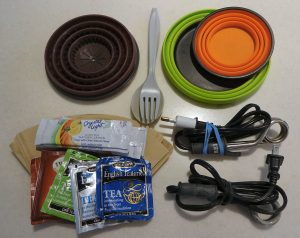 Food Kit. You never know when or if you’ll eat so I always bring something to tide me over. I also bring two, not one, electric heating coils (REI, $12). They burn out easily so one is a backup. A cup to heat water in. A couple of cup-a-soups, tea bags, and other necessities. One of the most appreciated is the crystal light to add some flavor to bottled water in Africa and the Stans (Tajikistan, Kyrgyzstan, etc). Bottled water in most of those places tastes like caca. A collapsable bowl (green in photo), cup (orange) and drip coffee maker (brown). All this fits into the front of my suitcase. I sometimes use the bowl if I’m able to buy cereal and long-shelf life milk. (Don’t consider buying non-homogenized local milk anywhere. It’s not safe and you have a 100% chance of getting amoebic dysentery. The long shelf life, sometimes called irradiated milk, is safe everywhere). African hotels are notorious for charging astronomical prices for breakfast, sometimes as high as $35. I make do with cereal and a cup of coffee – all from my “food kit”. Saving $30 per day keeps me happy.
Food Kit. You never know when or if you’ll eat so I always bring something to tide me over. I also bring two, not one, electric heating coils (REI, $12). They burn out easily so one is a backup. A cup to heat water in. A couple of cup-a-soups, tea bags, and other necessities. One of the most appreciated is the crystal light to add some flavor to bottled water in Africa and the Stans (Tajikistan, Kyrgyzstan, etc). Bottled water in most of those places tastes like caca. A collapsable bowl (green in photo), cup (orange) and drip coffee maker (brown). All this fits into the front of my suitcase. I sometimes use the bowl if I’m able to buy cereal and long-shelf life milk. (Don’t consider buying non-homogenized local milk anywhere. It’s not safe and you have a 100% chance of getting amoebic dysentery. The long shelf life, sometimes called irradiated milk, is safe everywhere). African hotels are notorious for charging astronomical prices for breakfast, sometimes as high as $35. I make do with cereal and a cup of coffee – all from my “food kit”. Saving $30 per day keeps me happy.
On longer trips or to really questionable places I carry a little more food. I buy Ramen noodles and keep the soup and flavor packets, and throw away the noodles. The flavor packets alone are great. For a little more substance, I add a can of chicken. If you don’t like chicken they also make turkey, pork, and pureed snake.
Other choices are pouches of salmon, tuna, and albacore. Tuna and albacore are both tuna and taste exactly the same except albacore costs twice as much. Starkist also makes flavored salmon. I really like these but be sure to taste them before buying 20 packs and heading out on a long trip, as I did. Some of them taste like fried butt. On one long trip I choked down 19 packs of the Teriyaki flavored tuna, one of the foulest things I’ve ever eaten.
Laundry. If you’re away for more than a week, you’ll need to do laundry. Always check the price list before turning it in at your hotel. Sometimes it’s incredibly cheap, or even free. Most times it’s unbelievably expensive and you’ll want to do it yourself by washing in your sink and drying everything in your room. For that I carry a 20-foot piece of parachute cord, which is also handy for tying people up or, potentially, hanging myself. I’ve learned to only wash my underwear, t-shirts, PT gear, short pants, and socks. Everything else ends up looking like crumbled up tin foil. Iron it you say? Yeah, right. Irons are alien technology and African & Central Asian hotels wouldn’t lend them out even if they had them. You’ll have to suck it up and send out your shirts and pants. You can wash military field uniforms but carefully lay them flat out on a towel and leave plenty of time for them to dry.
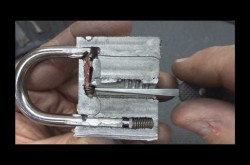
Other Junk.
Bring your own shampoo, shaving cream, and razors – there won’t be any free stuff at the hotels in bad places. Make sure they’re new (full), because replacing these items in Africa is mission impossible. If you forget something, you’ll have to do without it for the entire trip. Africa doesn’t have it, whatever it is. If they DO have it, the quality is so poor that you won’t want it. Everything in Africa is the cheapest, lowest quality Chinese junk on the planet.
You should expect that your hotel room will be pretty Spartan, with maybe a bed. That’s it. No hangars for your clothes, no adapters, no shampoo, rinse, mouthwash, body lotion, bubble bath, plastic shower cap, fluffy robe, nothing. Sometimes your bed will have a free serving of bedbugs or fleas, but more on how to deal with that exciting subject later. If you need it, bring it.
Bring a Gerber tool in your shaving kit. There’s a 100% chance something in your hotel room will need repair or disassembly. After a couple weeks in Africa you might want to stab someone, possibly even yourself. While you’re at it, throw in a roll of 100mph tape, commonly called duct tape. It’s more valuable than gold, especially when you come across your first French-inspired and Chinese built showerhead. They always leak and never stay attached to the wall. A strip of duct tape works wonders.
I organize all my junk into small brown nylon pouches ($6, eBay) and write on the outside with black marker so I can tell them apart. This is one of several and contains my, well, you can read. I carry at least one battery of every type I need as well as two extra TSA locks and a couple of series-200 Army locks. When leaving the U.S., you have to use those junkie little TSA locks that any respectable African can break with his teeth. Fortunately, all the other countries on our planet recognize that crime in airports is a problem and allow us to use stronger locks. Even when re-entering the U.S., you can secure our suitcases with the big locks.
Update: You can now check luggage when departing the US that is secured with “real” locks. When you check bags secured with these you simply have to stand by the X-ray screeners until they finish screening the bag. If they need it opened you can open it, let them eyeball everything, then re-lock it. When traveling to Africa or South America, I recommend that you do not trust TSA locks.
Carry a pack of baby wipes with you at all times. You will never find toilet paper, soap, or paper towels anywhere in Africa, South America or Central Asia. They’re also good for wiping down airline trays, seats, baggage carts, and small monkeys.
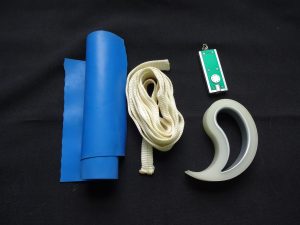 This is my gym. Most hotels have no gym and there’s usually nowhere to run or exercise that’s safe or secure. This rudimentary gym lets me do something in my room. The blue elastic is great for resistance training. Throw in some calisthenics and you’ve gotten your heart rate up. The white nylon strap is for yoga stretching and starting fires. The white teardrop looking thing is a lightweight wedge that I place under my door to prevent people from walking in on me. It works surprisingly well.
This is my gym. Most hotels have no gym and there’s usually nowhere to run or exercise that’s safe or secure. This rudimentary gym lets me do something in my room. The blue elastic is great for resistance training. Throw in some calisthenics and you’ve gotten your heart rate up. The white nylon strap is for yoga stretching and starting fires. The white teardrop looking thing is a lightweight wedge that I place under my door to prevent people from walking in on me. It works surprisingly well.
All this stuff fits into my suitcase, will last for a long trip, and only weighs 47 pounds. For flights originating in the continental United States, the bag limit is 70 pounds. This weight limit is good to wherever you checked the bags to go. If the bags stop anywhere and you have to take custody of them, that 70-pound rule no longer applies. For example: You’re going to Nigeria and check your bags all the way Accra. You’re allowed to check in up to 70 pounds. Even if you decide to stop in Darmstadt, Germany for a day or so, you’re still authorized 70 pounds because your ticket covers you all the way to Accra. Coming home is a different story. You’re allowed only 25 kilograms, or about 52 pounds. More than that and you can expect to pay up to 15 Euro per kilogram! Plan accordingly.
Final checks. I’ve left a lot of stuff in hotel rooms. Shaving kits, alarm clocks, clothes in drawers, and one time even a charging cell phone. I never got any of it back, nor will you. One technique I’ve found useful is what I call my “final check”. Once I’m ready to check out I move my suitcase into the hallway. Then I re-enter the room and scan everything, open every drawer, look in every closet, the safe, and check every socket for anything I forgot. Look carefully in the bathroom because I’ve forgotten more stuff there than anywhere else. Only when I’m done inspecting everything do I depart the room for the last time.
There are two ways to apply your points, and you must make this choice up front: Have them credited one of your airlines for miles; or accumulate points for future hotel upgrades.
Maids and tipping. Maids everywhere work hard and are generally underpaid and underappreciated. People treat them like crap, failing to notice how influential maids can be over your quality of life. Do you like clean sheets, and dry, clean towels? Maids usually have the power to give you free stuff (extra towels, bottled water, tiny bars of soap, etc). Sometimes they will even do you favors, like wash your clothes a lot cheaper than the official hotel rate (They do it anyway so why not put a little cash in her pocket instead of the hotel’s?). Most people leave a tip at the end of their stay (or not at all). That’s not the best way for you to benefit because in Africa nobody tips and they have no idea that you will. Before I leave home I get 100 single dollar bills from my bank. I use these to tip for everything, figuring there’s no way I can hide the fact that I’m an American, so why not go in their face with $1 bills? Beginning on day one I leave $3 on my pillow with a short note thanking the housekeeper for “taking care of me”. Every day I leave $3 in the same place. Around day 5-6 I leave my laundry bag next to my bed with $5-10 (in ones) on top of it. More often than not when I come home that night my laundered, folded and pressed clothes are lying on my bed. No charge. I just saved $50… It doesn’t happen every time, but often enough for me to stay motivated.
Frequent-Stayer Clubs. Similar to frequent flier clubs these let you accumulate points with every stay. Like the airlines there are only a few that you need to join. Forget domestic ones like Best Western, Days Inn, etc. The International clubs you need to join are Priority Club (good in Holiday Inn and Intercontinental) and Starwood Preferred Guest (SPG), good in Sheraton, Mercure, Meridien, and several other European hotels. That’s it. There are two ways to apply your points, and you must make this choice up front: Have them credited one of your airlines for miles; or accumulate points for future hotel upgrades. I recommend keeping the points because the exchange rate from points into miles is pretty bad. Also, it’s nice to get upgraded or get to stay on the Concierge level once in a while – it feels like Christmas.
Rental Car Clubs. Not worth the trouble. I have them all and have never benefitted in any way. We usually get vehicles with drivers or rent from “Jose’s Island Rental”, which has no club.
Alien Technology and other Wizardry
There’s a whole list of things that’ll make your life easier and more secure, both on the road and back home. If you travel a lot, especially overseas to really bad places, these items may save you a lot of pain and misery and might even save your life.
Plug Adapters, Voltage and Chargers. I’ve already talked a little about these but it’s important enough to mention again so you don’t forget to bring them. Without them you won’t be able to plug anything into the local outlets. If you do forget, there’s a tiny, almost non-existent chance that the front desk will have an adapter to loan or sell at a greatly inflated price. Unless you’re in Europe you won’t be able to buy adapters in your target country.
Many hotels use the Internet as a profit center and charge up to $20 per day for access per device.
The voltage in the U.S. is 110 volts at 60 hertz. Everyone else in the world uses 220 volts at 50 hertz. When you’re buying stuff to take along on your trips, just make sure either it or the charger is dual voltage. Almost all electronics today is dual voltage and automatic switching, so this should not really be an issue for you. The frequency is another matter, especially if you intend to use something with an electric motor, like a plug-in clock or electric razor. Electric motors will run about 15% slower and about 30% hotter. Your antique plug-in clock will lose 10 minutes every hour. If you take an electric razor it will run slower (if it’s a plug-in) and be too hot to hold when you’re done. Its life will be shortened significantly by overheating. It will charge slower and the battery will overheat, shortening its life. If you must have an electric razor, buy a dual voltage one. I recommend disposable plastic razors. Light, cheap and they can be easily fashioned into a ninja weapon.
Necessary Cords. Don’t forget the charging and connection cords for all your toys. Make a list of your electronics and attach a label to each of the chargers and cords so you can check them off your list before closing your suitcase. I once forgot my iPhone charger while on a 6-week trip. I bought a replacement when passing through the Frankfurt airport for 112 Euros. I’ve also forgotten my iPod and iPad charger. That only cost me 35 Euros. They were expensive mistakes. Checklists are worth their weight in gold. Really.
Wireless Router. This is a new addition to the technology list and is working out very well. I bought a portable wireless router (Trendnet TEW-654TR, $55 on Ebay) recently. My logic was that I have several wireless devices (iPhone, laptop, iPad, Kindle), as do others that travel with me. I just plug the hotel room’s LAN cord into my router and, viola! Convenient wireless Internet for all our devices. Many hotels use the Internet as a profit center and charge up to $20 per day for access per device. If everyone you are traveling with is on the same floor just give them the router’s password and use the same wireless connection, thus saving a lot of money. The router is about the size and weight of a pack of playing cards, is powered by either USB or wall socket.
